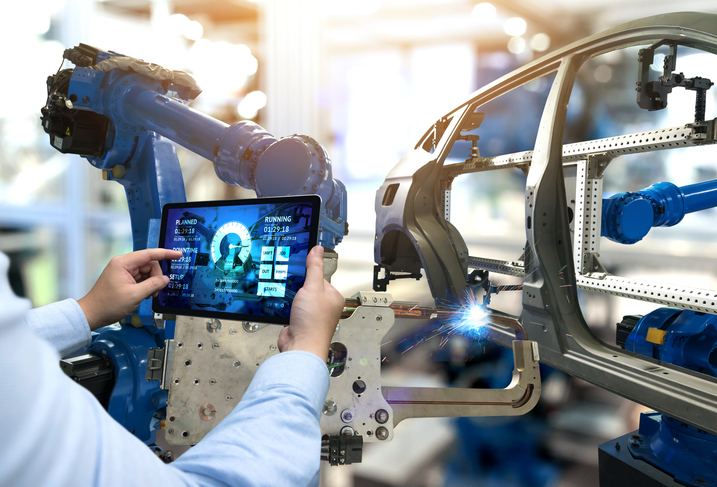The manufacturing sector is transforming as cutting-edge technologies redefine how businesses operate. By leveraging innovations like AI, robotics, 3D printing, smart factories, and augmented reality, manufacturers can boost efficiency, enhance productivity, and foster sustainability. Discover how adopting these emerging technologies can unlock new opportunities for business growth.
Understanding the Emerging Technologies in Manufacturing
Often referred to as the Fourth Industrial Revolution, Industry 4.0 represents a massive shift in how manufacturers are integrating technology and automation. This digital transformation is fundamentally changing how businesses optimize processes, reduce costs, and increase production efficiency.
By adopting advanced technologies like AI, robotics, IoT, and additive manufacturing, businesses can gather real-time data that offers actionable insights to improve operations. The ability to create flexible systems enables manufacturers to adapt swiftly to changing market demands and stay ahead in a competitive landscape.

Benefits of AI-Powered ERP Systems
Download this guide to discover how your business can leverage powerful insights, enhance decision-making processes and streamline operations.
Key Technologies Driving Manufacturing Transformation
The manufacturing industry is undergoing a profound transformation, powered by technologies like AI, robotics, and IoT. These advancements help overcome challenges such as high implementation costs and security risks while unlocking new capabilities, such as predictive maintenance, automation, and real-time data analysis, to further optimize operations.
Artificial Intelligence (AI) for Predictive Maintenance and Quality Control
AI’s role in manufacturing continues to expand, helping companies analyze vast amounts of real-time data from production lines and equipment. This enables predictive maintenance, identifying potential issues before they escalate, and ensuring that operations run smoothly. Machine learning algorithms also improve quality control by identifying defects early in the production process.
Robotics and Automation Enhancing Productivity
Automation and robotics have long been pivotal in improving productivity within manufacturing. Cobots, or collaborative robots, work alongside human employees to perform repetitive tasks more efficiently and safely. By integrating robotics with IoT sensors, manufacturers can create adaptive production environments that respond quickly to business needs.
Additive Manufacturing (3D Printing) for Custom and Efficient Production
3D printing is revolutionizing production by allowing manufacturers to print complex parts quickly and cost-effectively. When paired with smart factory systems, additive manufacturing offers unmatched precision, reduces production time, and improves supply chain efficiency. For industries requiring complex components, like aerospace or automotive, 3D printing enables rapid, on-demand manufacturing.
Internet of Things (IoT) Enabling Connected Smart Factories
The Internet of Things (IoT) enables the creation of smart factories where devices and sensors are connected, allowing real-time data collection and analysis. This improves resource allocation, predictive maintenance, and decision-making. For instance, IoT sensors on machines can track performance and alert maintenance teams before breakdowns occur.
In food processing, IoT devices monitor temperature and humidity to ensure proper storage and reduce waste. Additionally, IoT energy management systems optimize electricity use by adjusting lighting and machinery during off-peak times, reducing costs and increasing efficiency.
Augmented Reality (AR) and Virtual Reality (VR) for Training and Quality Assurance
Augmented Reality (AR) and Virtual Reality (VR) are transforming the way manufacturers approach training and quality control. These technologies provide immersive experiences that enhance employee training, enable remote maintenance, and improve product design by visualizing prototypes in a virtual environment.

Supporting Technologies Enhancing Manufacturing Capabilities
Beyond the core technologies, several supporting innovations further enhance manufacturing processes.
Big Data and Advanced Analytics
With the help of IoT and cloud-computing, big data analytics enable manufacturers to gain actionable insights from large datasets. These insights help improve product quality, predict demand, and optimize production scheduling, ultimately boosting efficiency across operations.
Blockchain for Supply Chain Transparency and Security
Blockchain technology provides secure, transparent tracking of goods across the supply chain, ensuring product authenticity and improving traceability. For manufacturers, this translates to enhanced visibility, reduced risks, and greater consumer trust.
Cybersecurity for a Connected Future
As manufacturing becomes more connected, the risk of cyber threats increases. Implementing robust cybersecurity measures such as AI-driven threat detection and zero-trust architecture ensures that sensitive operational data is protected from malicious attacks.
Sustainable Manufacturing Practices
Environmental responsibility is a growing priority for manufacturers. By adopting sustainable practices, such as using renewable energy sources and reducing waste, companies can meet regulatory requirements while strengthening their brand’s reputation among eco-conscious consumers.
Ready to start your digital transformation journey?
Overcoming Challenges in Integrating Emerging Manufacturing Technologies
Change can be challenging, especially when it comes to integrating modern technologies in manufacturing. There are several barriers that exist to successful integration, including high implementation costs, workforce training, cybersecurity risks of increasingly connected environments, and compatibility with legacy systems. These obstacles can slow down adoption, which can impact your productivity.
Overcoming these challenges requires you to plan thoroughly before integration. You need to conduct a comprehensive assessment and invest in employee training to ensure your workforce can handle new technologies. Additionally, you want to consult with an expert to ensure the solution you choose is scalable and compatible with your existing technology.
Ready to overcome these challenges and start your digital transformation? Download our free ebook, “Digital Transformation Checklist,” to gain insights for navigating the complexities of digital transformation while you drive lasting change within your organization.
When these barriers are addressed, successful integration of emerging manufacturing technologies is possible. And with these recent technologies, you can improve your efficiency, reduce your costs, and gain a competitive edge. These advantages make these latest trends worth the effort and investment.
How Ultra Consultants Helps Manufacturers Integrate Technologies
As global supply chains face increasing disruptions, embracing automation and emerging technologies is more crucial than ever. At Ultra Consultants, we provide expert guidance on digital transformation and enterprise software integration, helping manufacturers implement these cutting-edge technologies seamlessly.
Our deep industry knowledge and proven methodology empower manufacturers to drive efficiency, reduce costs, and unlock new growth opportunities. By partnering with Ultra Consultants, you can navigate the challenges of technology integration and stay competitive in an ever-evolving market.
Take control of your digital transformation journey by optimizing your people, processes, and technology. Request a free discovery call today.
Table of Contents
More ERP material...
Why Smart Factories Are No Longer Optional for Food Manufacturers
Discover why smart factories are essential in 2026 for food and beverage…
Top ERP Software Trends 2026: AI Capabilities to Watch
Learn why analyzing and improving processes upfront is critical to reducing risk,…
Why Do Business Process Analysis Before a New ERP System
Learn why analyzing and improving processes upfront is critical to reducing risk,…



